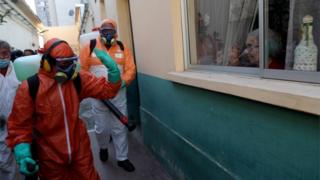This website uses cookies so that we can provide you with the best user experience possible. Cookie information is stored in your browser and performs functions such as recognising you when you return to our website and helping our team to understand which sections of the website you find most interesting and useful.
 Image copyright Reuters
Image copyright ReutersChile's government has said it will go ahead with a controversial plan to issue certificates to people who have recovered from Covid-19.
The documents would be given to people to allow them to return to work, Deputy Health Minister Paula Daza said.
The World Health Organization (WHO) has said there is "no evidence" that people who contract coronavirus are immune from being infected again.
It said certificates could inspire false confidence and help it spread.
Chile has reported 189 virus-related deaths and more than 13,000 confirmed cases of coronavirus, according to data from Johns Hopkins University.
"There is currently no evidence that people who have recovered from Covid-19 and have antibodies are protected from a second infection," the WHO said in a briefing note on Friday.
The body argued that so-called "immunity certificates" could even be harmful, because they could lead people to ignore public health advice and therefore increase the risk of transmitting the disease.
But Ms Daza told reporters on Sunday: "One of the things that we know is that a person who has had the illness has a lower probability of becoming ill again."
She added that the certificates would not confirm that people had immunity to Covid-19, but rather state that they had recovered from the disease and had completed a period of isolation.
At least 200,000 people have died with the coronavirus across the world, and many governments are now trying to find ways to ease their lockdown restrictions.



 Africana55 Radio
Africana55 Radio 
